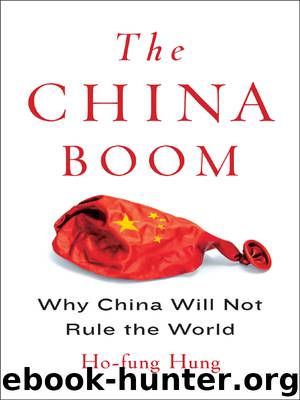The China Boom by Ho-fung Hung

Author:Ho-fung Hung
Language: eng
Format: epub
Tags: POL054000, Political Science/World/Asian, HIS008000, History/Asia/China
Publisher: Columbia University Press
Published: 2015-11-02T16:00:00+00:00
FIVE
A Post-American World?
MANY ASSERT THAT, accompanying the economic rise of China, the global political center of gravity has been shifting from West to East and from developed countries to developing ones. British writer Martin Jacques’s book When China Rules the World (2009), discussed in the introduction, is an example of this argument. Roger Altman, a veteran investment banker and former deputy secretary of the U.S. Treasury, published the article “The Great Crash, 2008: The Geopolitical Setback for the West” (2009) in Foreign Affairs in the wake of the global financial crisis, arguing that the West’s financial distress and China’s continuous robust economic performance were accelerating the waning of American’s global power and the waxing of China’s. Journalist Fareed Zakaria even titled his 2009 best seller The Post-American World, seeing the rise of China at the expense of the United States as a global power shift comparable to the rise of the West during the Renaissance and rise of the United States in the twentieth century.
This stipulation of China’s rising global power at the expense of the West in general and of the United States in particular is in fact a continuation of the theme of U.S. decline raised since the 1970s. This theme crosses the left–right divide and is shared by conservative, liberal, and radical authors. For example, looking closely at the U.S. defeat in Vietnam and its persistent fiscal, economic, and sociopolitical crises in the 1970s, in conjunction with economic challenges from West Germany and Japan, Marxian world-system analysts reason inductively that the United States had entered a phase of hegemonic decline just as the United Kingdom did in the early twentieth century and as the Dutch did in the eighteenth century (Wallerstein 1979; Arrighi 1994; Arrighi and Silver 1999; Chase-Dunn et al. 2005). Drawing on experiences of past hegemonic transitions from the Dutch to the British and from the British to the Americans, world systemists have for several decades enthusiastically looked for potential candidates for a new hegemon that will provide global leadership and reformulate the world system, with Germany (or a unifying Europe) and Japan topping the list in the 1970s through the 1990s. In more recent years, they have started to see China as a plausible new global leader in the twenty-first century, with Andre Gunder Frank’s book ReORIENT (1998) spearheading such speculation.
From a different vantage point, Samuel Huntington (1996) also sees the long decline of U.S. and Western power in politicomilitary, demographic, and economic terms. He argues that territories controlled by Western powers have been receding ever since the decolonization movement began in the mid–twentieth century. Demographically, low birth rates have been turning the Western population into a minority in the world. Economically, the “Sinic” world has been roaring ahead and in this view is poised to replace the Western world as the world’s economic center. Huntington purports that the Sinic world, empowered by its newfound economic might, is becoming increasingly assertive and is developing an alliance with the Muslim world, which has been predisposed to hate Western civilization.
Download
This site does not store any files on its server. We only index and link to content provided by other sites. Please contact the content providers to delete copyright contents if any and email us, we'll remove relevant links or contents immediately.
| Arms Control | Diplomacy |
| Security | Trades & Tariffs |
| Treaties | African |
| Asian | Australian & Oceanian |
| Canadian | Caribbean & Latin American |
| European | Middle Eastern |
| Russian & Former Soviet Union |
The Secret History by Donna Tartt(19035)
The Social Justice Warrior Handbook by Lisa De Pasquale(12183)
Thirteen Reasons Why by Jay Asher(8885)
This Is How You Lose Her by Junot Diaz(6873)
Weapons of Math Destruction by Cathy O'Neil(6261)
Zero to One by Peter Thiel(5784)
Beartown by Fredrik Backman(5734)
The Myth of the Strong Leader by Archie Brown(5495)
The Fire Next Time by James Baldwin(5426)
How Democracies Die by Steven Levitsky & Daniel Ziblatt(5211)
Promise Me, Dad by Joe Biden(5141)
Stone's Rules by Roger Stone(5080)
A Higher Loyalty: Truth, Lies, and Leadership by James Comey(4947)
100 Deadly Skills by Clint Emerson(4915)
Rise and Kill First by Ronen Bergman(4776)
Secrecy World by Jake Bernstein(4739)
The David Icke Guide to the Global Conspiracy (and how to end it) by David Icke(4697)
The Farm by Tom Rob Smith(4501)
The Doomsday Machine by Daniel Ellsberg(4482)
